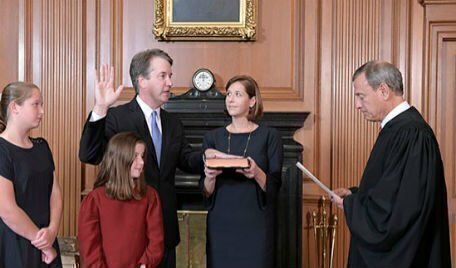The Supreme Court announced on Saturday afternoon that the new Justice, Brett M. Kavanaugh, would promptly take two oaths, so that he “can begin to participate in the work of the Court immediately.”
 Swiftly, 18 minutes after Vice President Pence had announced to the Senate that it had just confirmed the new nominee by a vote of 50-to-48, the Court released this statement:
Swiftly, 18 minutes after Vice President Pence had announced to the Senate that it had just confirmed the new nominee by a vote of 50-to-48, the Court released this statement:
“The Honorable Brett M. Kavanaugh will be sworn in as the 102nd Associate Justice of the Supreme Court on October 6, 2018. Chief Justice John G. Roberts, Jr., will administer the Constitutional Oath and retired Associate Justice Anthony M. Kennedy will administer the Judicial Oath in a private ceremony later today in the Justices' Conference Room at the Supreme Court. Both oaths will be administered so that he can begin to participate in the work of the Court immediately. A formal investiture ceremony will take place at a special sitting of the Court in the Courtroom at a later date.”
Every new Justice is required to take both oaths, one required by the Constitution, and one by a federal law; Congress chose the exact wording of each.
Here is the “Constitutional Oath,” given that name because the text of the Constitution’s Article VI itself requires all federal officers to vow to “support and defend” that basic document (the actual wording is provided by a federal law):
“I, _________, do solemnly swear (or affirm) that I will support and defend the Constitution of the United States against all enemies, foreign and domestic; that I will bear true faith and allegiance to the same; that I take this obligation freely, without any mental reservation or purpose of evasion; and that I will well and faithfully discharge the duties of the office on which I am about to enter. So help me God.”
Here is the “Judicial Oath,” a version of which has been required of all federal judges since Congress first required it in 1789, when the new American government – and the new Supreme Court – came into being:
“I, _________, do solemnly swear (or affirm) that I will administer justice without respect to persons, and do equal right to the poor and to the rich, and that I will faithfully and impartially discharge and perform all the duties incumbent upon me as [title of office] under the Constitution and laws of the United States. So help me God.”
Some new members of the Court have taken one or both of the offices at places other than the Court, such as the White House, and repeated them at the Court. Once, though, is actually enough.
Retired Justice Kennedy is taking part in the ceremony at the Court apparently for two reasons: Kavanaugh is succeeding him, and Kavanaugh once served as a law clerk to Kennedy on the Court.
Justice Kavanaugh’s first appearance on the Court bench will be just before 10 a.m. on Tuesday, when all nine Justices will go to the bench, to issue orders and hold a morning of hearings on pending cases. The Court will not be in public session on Monday because of a holiday.
The new Justice can bring along with him the law clerks who have been serving him as a judge on the U.S. Court of Appeals for the District of Columbia Circuit. He also could pick up law clerks that Kennedy had hired before announcing his retirement.







